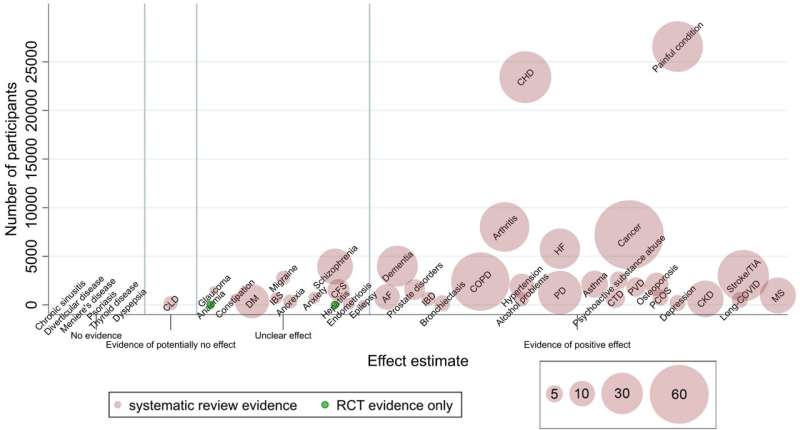This article has been reviewed according to Science X's editorial process and policies. Editors have highlighted the following attributes while ensuring the content's credibility:
fact-checked
peer-reviewed publication
trusted source
proofread
Exercise programs benefit a wide range of long-term health conditions, finds health data analysis

A new study looking at health data from the last 20 years has highlighted the benefits of exercise programs for individuals living with long-term health conditions.
Drawing on a comprehensive overview of published evidence spanning 39 different long-term conditions—and encompassing 990 randomized controlled trials and more than 900,000 patients—the research underscores the fundamental role of exercise in enhancing the well-being of individuals living with long-term health conditions.
Conducted by researchers at the University of Glasgow in collaboration with the University of Leicester, University of Birmingham, University of Exeter, University of Salford, University of York, and Trinity College Dublin, the latest study is published in eClinicalMedicine.
Chronic disease is one the major challenges facing international health care systems, with almost half of the global population suffering from at least one long-term health condition.
Defined as conditions for which there is currently no known cure, long-term health conditions are instead managed through a combination of drugs and non-pharmaceutical treatments, including exercise programs.
While medication can abate symptoms, exercise programs have been shown to have an impact on people's physical and mental health, with positive effects on cardiovascular and respiratory health as well as mood and general well-being.
In this study, the researchers found that participation in exercise programs leads to consistent improvements in exercise capacity as well as enhanced quality of life across a broad spectrum of 25 long-term conditions. However, there remained some areas of uncertainty, including the impact of exercise programs on mortality and hospitalization rates for people with long-term conditions.
Researchers argue the findings of the study indicate the need for health care services to adopt approaches that consider the importance of targeted exercise interventions for people who have one or more long-term health conditions.
Dr. Grace Dibben, lead researcher of the study from the University of Glasgow's MRC/CSO Social and Public Health Sciences Unit, said, "Almost half of the global population live with at least one long-term condition, which results in substantial health and socioeconomic burden.
"Our findings underscore the urgent need for health care systems to integrate exercise interventions into the management of long-term conditions, to better address the diverse needs of individuals living with a wider range of long-term conditions."
The study is part of the PERFORM (Personalized Exercise-Rehabilitation For people with Multiple long-term conditions (multimorbidity)) program, which aims to co-develop (with patients, caregivers, clinicians and service commissioners) a bespoke program of personalized exercise-based rehabilitation for people with multimorbidity.
The University of Leicester are coordinating this multi-center trial and Sally Singh, Professor of Pulmonary and Cardiac Rehabilitation, is the co-chief investigator with Professor Rod Taylor of the University of Glasgow.
The researchers have recently completed the feasibility study and the results will inform the main randomized trial due to start recruitment in September 2024 across 20 sites. Multiple long-term conditions are a major priority area of the National Institute for Health and Care Research (NIHR).
More information: Grace O. Dibben et al, Evidence for exercise-based interventions across 45 different long-term conditions: an overview of systematic reviews, eClinicalMedicine (2024). DOI: 10.1016/j.eclinm.2024.102599




















